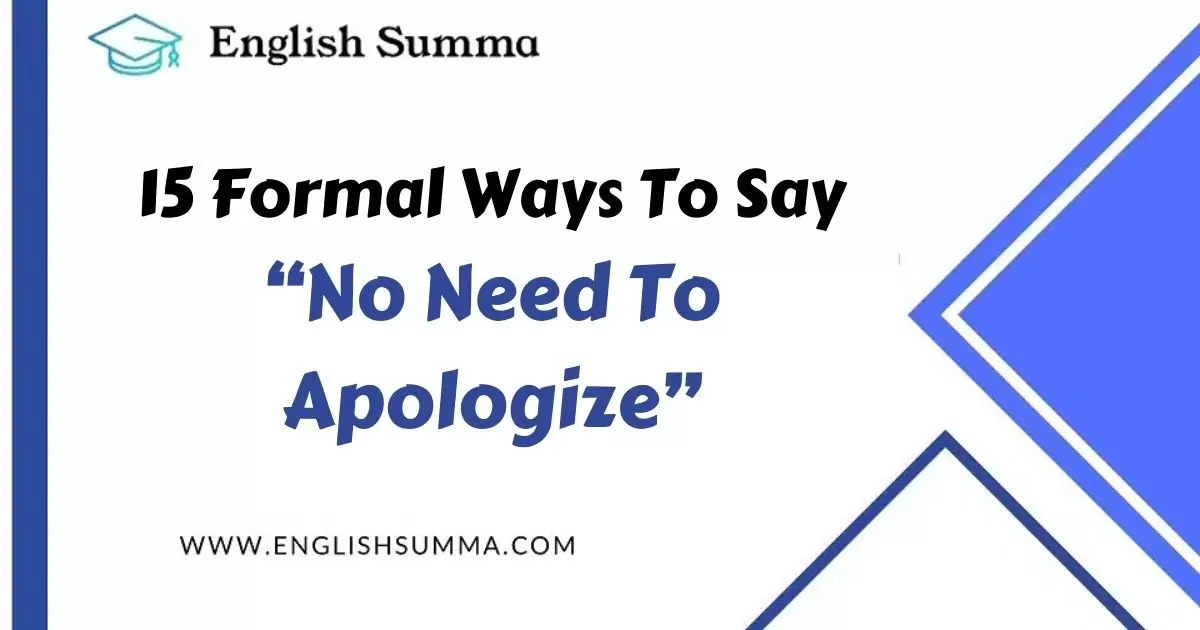In the dynamic realm of professional communication, expressing reassurance without necessitating an apology is a valuable skill. Whether faced with a minor hiccup or a challenging situation, conveying understanding in a formal manner contributes to maintaining a positive atmosphere. Let’s explore 15 formal ways to convey “no need to apologize” in various scenarios.
Urdu poetry began in the Indian subcontinent. It emerged in the 13th century. This period saw the blending of various cultures. The region was a melting pot of languages and traditions. Urdu poetry flourished during the Mughal Empire. The emperors patronized poets and artists. They created a fertile ground for poetic expression. Urdu poetry was born from this cultural fusion.
1. There’s Absolutely No Need for an Apology
Dear Justin Taylor,
I received your email regarding the slight delay in the project. Please rest assured that there’s absolutely no need for an apology. These unforeseen circumstances happen, and I appreciate your transparency in keeping me informed.
Best regards,
James Wilson
Additional Tip: Acknowledge the situation and express appreciation for their transparency.
2. No Apology is Necessary, I Understand Completely
Dear Justin,
Thank you for your message. I want to assure you that no apology is necessary; I understand completely. Your dedication to resolving the issue promptly speaks volumes.
Sincerely,
James Wilson
Additional Tip: Emphasize understanding and appreciate their dedication.
3. Your Apology is Not Required; Everything is Fine
Dear Justin Taylor,
I acknowledge your concern, but please know that your apology is not required; everything is fine. These minor setbacks are part of the process, and I appreciate your commitment to rectifying the situation.
Best regards,
James Wilson
Additional Tip: Highlight that everything is in order and express gratitude for their commitment.
4. No Need to Apologize, I Appreciate Your Efforts
Dear Justin,
I received your email and want to assure you that no need to apologize; I appreciate your efforts. Your dedication to addressing the issue promptly is commendable.
Sincerely,
James Wilson
Additional Tip: Commend their efforts and express appreciation for their commitment.
5. Apologies Aren’t Necessary; Your Understanding is Enough
Dear Justin Taylor,
I understand the challenges you faced. Please know that apologies aren’t necessary; your understanding is enough. We value your dedication to overcoming obstacles.
Best regards,
James Wilson
Additional Tip: Highlight their dedication in overcoming challenges.
6. There’s No Need for You to Apologize; I Completely Understand the Situation
Dear Justin,
I appreciate your email. However, there’s no need for you to apologize; I completely understand the situation. Your transparency is valued, and I trust in your ability to manage the matter.
Sincerely,
James Wilson
Additional Tip: Express trust in their ability to handle the situation.
7. You Needn’t Apologize; Everything is in Order
Dear Justin Taylor,
I received your message. Please know that you needn’t apologize; everything is in order. I appreciate your swift response and proactive approach to resolving the issue.
Best regards,
James Wilson
Additional Tip: Acknowledge their swift response and proactive approach.
8. Your Apology is Not Warranted; All is Well
Dear Justin,
I want to assure you that your apology is not warranted; all is well. Minor hiccups are expected, and I appreciate your diligence in handling the matter.
Sincerely,
James Wilson
Additional Tip: Acknowledge that all is well and express appreciation for their diligence.
9. No Need for an Apology; I Appreciate Your Attention to the Matter
Dear Justin Taylor,
I received your email and want to assure you that no need for an apology; I appreciate your attention to the matter. Your proactive approach is commendable.
Best regards,
James Wilson
Additional Tip: Commend their proactive approach to the situation.
10. There’s No Requirement for an Apology; Your Understanding is Acknowledged
Dear Justin,
I understand the circumstances outlined in your email. Please be assured that there’s no requirement for an apology; your understanding is acknowledged. I appreciate your continued cooperation.
Sincerely,
James Wilson
Additional Tip: Acknowledge their understanding and express gratitude for continued cooperation.
11. Apologies Are Unnecessary; Your Cooperation is Valued
Dear Justin Taylor,
Thank you for your email. Please understand that apologies are unnecessary; your cooperation is valued. I appreciate your commitment to working together to resolve any challenges.
Best regards,
James Wilson
Additional Tip: Emphasize the value of their cooperation in addressing challenges.
Don’t miss to read out “Formal Ways To Say “Talk To You Soon”
12. There’s No Call for an Apology; Your Actions are Understood
Dear Justin,
I want to reassure you that there’s no call for an apology; your actions are understood. I appreciate your swift response and proactive measures to rectify the situation.
Sincerely,
James Wilson
Additional Tip: Acknowledge their actions and express appreciation for their proactive measures.
13. No Need to Apologize; Your Consideration is Noted
Dear Justin Taylor,
I acknowledge your email. Please know that no need to apologize; your consideration is noted. Your attention to detail and consideration are highly regarded.
Best regards,
James Wilson
Additional Tip: Acknowledge their attention to detail and express appreciation for their consideration.
14. An Apology is Not Needed; I Comprehend the Circumstances
Dear Justin,
Thank you for keeping me informed. I want to assure you that an apology is not needed; I comprehend the circumstances. Your dedication to resolving issues promptly is commendable.
Sincerely,
James Wilson
Additional Tip: Highlight comprehension of the circumstances and commend their dedication.
15. No Apology is Expected; I Recognize Your Efforts
Dear Justin Taylor,
I received your email and want to assure you that no apology is expected; I recognize your efforts. Your commitment to addressing challenges head-on is appreciated.
Best regards,
James Wilson
Additional Tip: Express recognition of their efforts and commend their commitment to addressing challenges.
Final Thoughts
In conclusion, incorporating these formal ways to say no need to apologize in your professional communication can help maintain a positive and appreciative atmosphere, fostering effective collaboration and understanding.

